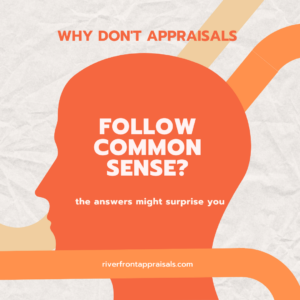
Property Taxes Just Went Up? We’ve Got You Covered!
It’s reassessment season for most folks in our area. Homeowners

A creed can be defined as “a set of beliefs which guide someone’s actions.” Appraisers are bound to a set of standards, like most professionals, but on a much deeper level, everything we do is based on three guiding principles: that we will be independent, objective, and unbiased.
Without these three qualities, we cease to be appraisers.
I wrote this post last year, but it’s being recycled because it’s just that important.
In this blog, we’ll look at each of these characteristics in detail, and specifically how they apply to the appraisal of real estate. And, we’ll finish with a discussion on why you should hire an appraiser.
Independence is defined as “Free from outside control; not influenced or affected by others.” Much like an investigator working a case, an appraiser must not be influenced by any outside source when developing their opinions. Many parties in the real estate transaction may try to influence the appraiser, such as the buyer or seller, Realtor, or loan officer. However, in order to remain completely independent, the appraiser must remain free from any attempts to control or influence the outcome of the appraisal. Herein lies the beauty of our profession. In most cases, we are hired by a financial institution to develop an opinion of the value of real property. It would not be in the client’s best interest if any party – who stood either to gain or lose money – gave their opinion as to what the property was worth. The appraiser enters as the lone voice of independence, giving an opinion of value not influenced by any outside person or force. Because the appraiser is independent, you can trust their opinion.
[bctt tweet=”The appraiser enters as the lone voice of independence, giving an opinion of value not influenced by any outside person or force. Because the appraiser is independent, you can trust their opinion.” username=”RiverfrontApp1″]
Objectivity is defined as “Not influenced by personal feelings or opinions in considering and representing facts.” Just as a historian tries to be objective and impartial in their retelling of history, an appraiser must be completely objective when developing their opinion of value. If an appraiser brings his or her own personal feelings into the equation, he or she immediately stops being an appraiser. I was once accused of undervaluing a property because I simply ‘didn’t like the lot’. Of course, the homeowner couldn’t have been more wrong. A good appraiser must come to the property completely open-minded and objective, and must leave their personal opinions and tastes at the office. Did I like that homeowner’s lot? No. Did I dislike the lot? No. I didn’t have a personal opinion. Our job is to develop opinions based not on warm and fuzzies, but on what the market is saying. Because an appraiser is not influenced by their own feelings or personal opinions, you can trust their professional opinion.
Bias is defined as “Showing prejudice in favor of, or against something.” An appraiser must be entirely unbiased and impartial, showing no prejudice for or against anything. Although some news sources today claim to be ‘unbiased’, it is likely that they will still lean towards one side or another. Being unbiased is difficult! But, if we cannot be unbiased in the development of our value opinions, we should turn the assignment down. That’s how important being unbiased is to an appraiser! If we have any current or prospective interest in the property, that is bias. If we are best friends or family members of the buyer or seller, that is bias. If any of these conditions exist, and the appraiser cannot remain 100% unbiased, then they should not take on the assignment. Because an appraiser will only accept assignments in which they can remain completely unbiased, you can trust their value conclusions.
So what does all of this mean to the average homeowner? Hire an appraiser. Why? Because in a typical real estate transaction, the appraiser is the only party (who has anything to do with value) who can remain completely independent, objective, and unbiased. We don’t have a commission riding on the line, we’re not trying to get the best deal on our purchase, and we’re not trying to sell a home for top dollar. We do our job, get paid, and move on. Do we hope everyone ends up happy? Of course! Do we want the buyer & seller to feel like they had a fair transaction, and that the loan officer and Realtors got a good commission? Absolutely! But none of that can come into consideration when we complete our assignment. Because we are free from the influence of others, do not bring our own personal feelings to the table, and show no prejudice, our value opinions are to be trusted – above the opinions of all others.
Helping homeowners navigate the appraisal process,
Ryan Bays, SRA, AI-RRS

It’s reassessment season for most folks in our area. Homeowners

I feel like we all need a laugh. How about

So this may be a slight break from the norm,
Riverfront Appraisals has been providing comprehensive valuations of residential properties to Western Kentucky and Southwestern Indiana since 2008.